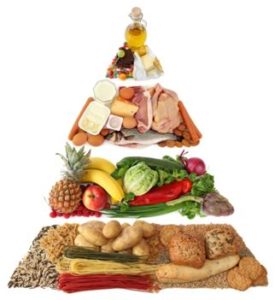As WHO says “Health is a state of physical, mental and emotional well being not just merely an absence of disease or infirmity”.
Food has been given a significant place in our lives both physiologically and culturally as it is our primary requirement. It is a substance necessary for survival, nourishment and nutrition, to sustain growth and repair, vital processes and to furnish energy. There are various factors that influence our food choice namely cost, availability, income or economic status, culture, peers, family etc.

Our human body is comprised of various biochemical constituents that help us function throughout the day. Those biochemical constituents are derived from the food we eat. Food is the source of energy that we need to function normally both physically and mentally in a given day. So in short what we eat is what we are!
Nutrients are the nourishing substances in the food that are essential for the growth, development and maintenance of body functions. If a nutrient is not present, some aspects of function and health declines. When the nutrient intake does not regularly meet with the nutritional needs the metabolic processes slow down. To prevent onset of disease we need to know how multiple nutrients in a diet interact and affect human body functions. Thus eating a variety of healthy foods promotes good health.
Food contains a lot of macro and micro nutrients. Macro nutrients are namely carbohydrates, fats and proteins. Micro nutrients are minerals and vitamins. Vegetables and fruits are the important sources of micro nutrients.
The amount of different nutrients a person needs depends on age, sex, activity, pregnancy and breastfeeding. Thus food acts as an accessory medicine to maintain, prevent and treat diseases.

